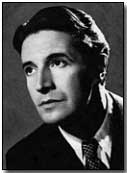Prose & Poetry - Ivor Novello
 Ivor Novello (1893-1951)
was born David Ivor Davies on 15 January 1893 in Cardiff. Novello was
educated at Magdalen College School in Oxford which he attended having won a
soprano scholarship; his mother was similarly a singer.
Ivor Novello (1893-1951)
was born David Ivor Davies on 15 January 1893 in Cardiff. Novello was
educated at Magdalen College School in Oxford which he attended having won a
soprano scholarship; his mother was similarly a singer.
He began writing songs while still at school under the name Ivor Novello of which a number were published and received a degree of popular acclaim.
With a reputation as something of a prodigy Novello left school and moved with his parents - his father was a tax collector - to London, living in New Bond Street in the immediate pre-war years. There he persevered with singing lessons through a visiting singing coach.
In 1913 Novello moved to a new address at 11 Aldwych - directly above the Strand Theatre - where he retained as his base until his death in 1951.
Novello's career took off with the publication in 1914 of Keep The Home Fires Burning, a sentimental tune which rapidly gained popularity among British servicemen and among those they left behind while serving at the Front. On the back of the fame earned from this song Novello received the first of many commissions to write music to accompany West End plays.
In 1916 - the same year he enlisted to serve with the Royal Naval Air Service (RNAS) as a pilot - Novello met the actor Bobby Andrews while in New York and developed an intimate relationship with him which spanned 35 years until Novello's death; they were also to feature together in Novello's plays.
Three years later Novello starred in his first major motion picture, The Call of the Blood (1919), a silent film. He went on to star in many subsequent film productions in non-singing roles and was regarded as something of a popular heart-throb.
1924 saw the debut of Novello's first play in which he himself starred alongside co-author Constance Collier, The Rat. This was followed by two sequels, The Triumph of the Rat (1926) and The Return of the Rat (1928).
In 1926 collaborated with Alfred Hitchcock in producing the movie The Lodger; they also worked together on Downhill the following year.
Other notable plays - he chiefly wrote melodramatic romantic musicals - included Symphony in Two Flats (1930), The Truth Game (1934), Proscenieum (1934), Glamorous Nights (1935), Careless Rapture (1936), Full House (1936), Comedienne (1938), The Dancing Years (1939), Perchance to Dream (1945), We Proudly Present (1947) and King's Rhapsody (1949).
Over the years Novello developed close friendships with many of Britain's leading theatrical and literary figures, including Sir Lawrence Olivier, Noel Coward and Siegfried Sassoon.
Novello's glittering career was interrupted during the Second World War when he was jailed in 1944 for illegal use of petrol coupons for his Rolls Royce car: he served half of an eight week sentence in Wormwood Scrubs.
During the 1939-45 war itself Novello continued to write and perform, offering what he regarded as a valuable morale booster to servicemen on active duty. To this end he travelled to perform in Belgium and France. We'll Gather Lilacs in particular was a popular wartime theme.
After the war Novello spent periods in Jamaica where he shared holidays with Bobby Andrews. Having composed over 250 songs on 6 March 1951 Novello collapsed and died at home of a coronary thrombosis just four hours after performing in King's Rhapsody; Andrews was at his side when he died. Novello's funeral at Golders Green Crematorium was broadcast live and attracted thousands of bystanders.
A "conchie" was slang used to refer to a conscientious objector.
- Did you know?
